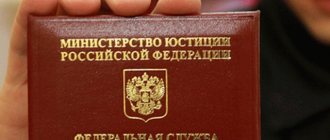Credit.info » Articles » What property do bailiffs have the right to describe?
Obtaining debtor status is not that difficult. This can happen not only due to late payments on borrowed debts, but also for non-payment of utilities, alimony, land and transport taxes. If such a person is sued for unfulfilled obligations, and the trial does not end in his favor, the case is transferred to the authority of the bailiffs. They will already be carrying out the collection process. What property can bailiffs describe? The fear of people who find themselves in such a situation is well founded. They worry about losing everything. Therefore, you should clearly know which property bailiffs can describe and which they do not have the right to describe.
The matter is in the hands of the bailiffs - what next?
You should not be afraid that the bailiffs will enter the home at any moment and begin the inventory procedure, snatching the last valuable things from the debtor’s hands. In fact, they must notify you of their visit in advance. According to the law, the debtor also has the right to challenge the actions of the bailiffs within ten days.
What can bailiffs describe in the apartment in which the debtor is registered? If the amount of debt does not exceed three thousand rubles, small household items will not be confiscated (microwave, chair, pan). After all, equipment is usually seized first. Here is a list of what bailiffs can describe in an apartment:
• Furniture items, if they are still in good condition and can be sold later. • New sets of dishes (the debtor is left only the minimum necessary - a few items). • Household appliances - the only exception is the refrigerator, and only if the inventory takes place in the summer. • Luxury items – jewelry, mink coats. All documentation of these items should be retained - if they do not belong to the debtor - this will need to be proven in court. • Real estate, if it is not under collateral. If the subject of the claim is a debt for utilities, the debtor may be evicted from this living space, giving him a smaller alternative.
This is the main list of what bailiffs have the right to describe. In fact, the list is much wider - they describe property that is more or less valuable without regard. It still directly depends on the size of the debt.
Having learned what bailiffs can describe, you should understand what they cannot claim.
So, what is not subject to seizure:
• Food products based on the minimum subsistence level for each dependent of the debtor. • Crops and seeds that are intended for sowing. • Domestic animals (cows, goats, chickens) used for personal use and not for sale. • Items necessary for engaging in activities that generate only income (an artist has canvas and brushes, a seamstress has a sewing machine, for example). • Dwelling, if it is the debtor’s only place of residence. But if this is not a mortgaged property. Otherwise, they will take her away too. • Items for individual use – personal clothing, shoes. From what bailiffs can describe from personal belongings is gold, jewelry, valuable furs. • Awards, orders, medals, prizes and cups. • Fuel, if it is necessary for cooking or heating the premises. • A plot of land, provided that it is not used for business activities.
The procedure for inventorying property by bailiffs begins with the following steps:
1. Drawing up a writ of execution, making a court decision. 2. Transfer of the court decision to bailiffs. 3. The process of seizure of property. 4. Legislative procedures - writing a property inventory act, its certification. 5. The debtor is given the opportunity, within five days, to take away property that is not subject to inventory. 6. Redirection of seized property to government agencies for subsequent sale.
How do bailiffs describe property? Alienation of property by employees of enforcement services is carried out with the obligatory presence of witnesses, civil servants and the bailiffs themselves.
The claim for seizure of property contains the following information:
• Data of all persons involved in the alienation process. • A written statement from the persons participating in the seizure procedure that the seizure is taking place with their knowledge and in their presence. • A list of all described items, their distinctive features identified during inspection. • Approximate value of all valuable items. • Name and surname of the citizen to whom the seized items are transferred for safekeeping. • Deadlines are set for prohibiting the use of this property. • The final signature of the debtor, where he agrees with what is written above and accepts responsibility in the event of concealing other valuable property from the bailiffs.
The document is also signed by all witnesses to the inventory of property by the bailiff. A photocopy of the document is made and handed over to all interested participants in the process.
How an arrest is made
The entire seizure procedure occurs sequentially, just as the inventory of property by bailiffs occurs: first, the seizure is imposed on financial assets, securities, and then on the debtor’s real estate (if the need arises).
All property described by bailiffs, the sale of which will be carried out under the direction of a division of the Federal Property Management Agency, will be in the custody of the specified person or with government bodies before the start of the auction. Valuation specialists must determine the value of the seized items if the bailiffs were unable to do this, or the debtor protests the amounts indicated by the bailiffs.
Attention! Due to recent changes in legislation, the legal information in this article may be out of date!
Our lawyer can advise you free of charge - write your question in the form below:
Debtors' rights: be prepared for a bailiff's visit!
Finding yourself in debt is as easy as shelling pears: late payment of utilities, transport or land taxes, alimony, late repayment of a mortgage or other bank loan. If you were unable to repay the debt voluntarily after it was recognized by the court, you need to prepare to communicate with bailiffs. Including their arrival “to visit” the house.
What does the law allow bailiffs to do, and what rights and guarantees do debtors have? Let's look at the most common questions that arise in practice.
Archive number No. 48 (894) dated November 29, 2011 - Consumer
STAY IN TOUCH!
At some point in our lives, any of us may face enforcement proceedings. "DDD" decided to find out what you can lose if you don't pay for housing and communal services on time or default on your loan?
Debt good turn deserves another
But what about expensive cats or rare breed dogs? “Yes, the arrest of rare or exotic animals living in the debtor’s house can be carried out in accordance with current legislation,” explain the bailiffs. “There were no such cases in Kursk, but in other regions cats that won exhibitions were seized.”
It is clear that bailiffs will not keep an iguana or a python in their office. Due to the lack of conditions for keeping the animals, they are transferred to the zoo. In this case, the debtor reimburses the costs of maintaining the arrested pets to the zoo.
During a visit to the debtor, the bailiffs do not have the right to seize the seeds necessary for the next sowing, as well as food and cash for a total amount not less than the established subsistence level of the debtor himself and his dependents. Let us explain with an example: the debtor is a working Kursk resident, his subsistence minimum is 5,357 rubles. The debtor has two children, the cost of living for each of them is 4,750 rubles. It turns out that after the bailiff leaves, the defaulter should have about 15 thousand untouchable “wooden” money left in his wallet. “It’s not worth talking about the products! – the bailiff smiles. “We are not animals to take food out of the refrigerator.”
Also not subject to seizure: fuel necessary for the debtor's family to prepare their daily food and heat their living quarters during the heating season; means of transport and other property necessary for the debtor due to his disability; prizes, state awards, honorary and memorable signs awarded to the defaulter.
Let us remind you that bailiffs only seize property that belongs to the debtor. If the defaulter lives with relatives and uses the same household appliances and furniture, he will have to prove that it was not he who bought this particular TV, but his mother or spouse. How? Proof in this case can be a signature on the warranty card for household appliances or a purchase and sale agreement from a furniture store. In other words, documents by which it is possible to clearly determine that an item belongs to a specific owner.
“Who will get my closet?”
This completes the list of property that bailiffs cannot seize. Having a six-month overdue loan, you can say goodbye to everything else - a second apartment or a mobile phone - in a matter of hours. First of all, bailiffs seize cash deposits, bank accounts and the most liquid objects - real estate, cars. In accordance with the Federal Law “On Enforcement Proceedings,” cash in rubles and foreign currency, precious metals and precious stones, products made from them, and scrap of such products are also subject to mandatory seizure in the event of seizure.
– In what cases can property be seized? Can the debtor use it after arrest?
“There are several types of seizure of property,” says Elena Skomorokhova, press secretary of the Office of the Federal Bailiff Service. – The first is used as an interim measure. The bailiff can independently issue a ruling and limit your rights to your property, including your apartment. It may prohibit you from disposing of it, that is, selling, donating, etc. But you can live and use it. The court may also apply such an interim measure. This is done so that none of the disputing parties can dispose of this property and then, if necessary, the debt can be repaid through its sale.
The second type is arrest for the purpose of foreclosure on property. In this case, the property is subject to arrest, seizure and transfer for sale or auction. Property is seized in proportion to the amount of debt.
– How is seized property sold?
– Specialized organizations do this. For example, seized and confiscated property is sold by the Federal Agency for State Property Management. The direct sale of valuables seized by bailiffs is carried out by the department of the Federal Property Management Agency in the Kursk region or organizations accredited with it.
The process itself takes place in two ways. The first is sales on a commission basis. This is how cars and equipment are sold. After transferring the property for sale, interested parties can pay the required amount by transferring it to the account of the Territorial Administration of the Federal Property Management Agency for the Kursk Region. After this, according to the acceptance certificate, you can receive what you purchased. An important point: property that has been on sale for more than a month is discounted by 15%, and for more than two months - by 25%. Then they offer to buy it back to the claimant; if he does not agree to this, the property is returned to the debtor.
The second way is to hold a tender or auction. This is how they sell apartments, houses, land plots, securities and collateral. This is a more complicated procedure. If the auction is declared invalid, the property will lose 15% in value. The property did not find an owner at the second auction? The seized apartment or dacha is returned to the debtor.
On the website of the Office of the Federal Bailiff Service for the Kursk Region you can find information about seized property - from real estate to household items.
* * *
Debtors in numbers
Over the 10 months of 2011, bailiffs of the Kursk region made 1,148 seizures of debtors' property. Property worth more than 257 million rubles was transferred for sale to the Territorial Administration of the Federal Property Management Agency in the Kursk Region, of which more than 177 million is the value of the mortgaged property.
Share link:
Read the latest news from “For Each Other” on social networks:
VKontakte, Odnoklassniki, Facebook, Twitter, Instagram.
Valeria BORISOVA
Question answer
What property bailiffs do not have the right to describe:
They cannot describe the main and only housing. It must be owned by the debtor. An exception to the rule is mortgaged housing, which serves as collateral for the loan. Also, real estate can be seized and provided with living space with a smaller square footage in case of debt to housing and communal services;
Casual clothing and shoes are not subject to encumbrance. An exception to the rule are luxury items, such as: mink, sable fur coats, leather goods, jewelry, jewelry;
Dishes. It is calculated based on the number of people living in the apartment. Services and memorabilia may be seized;
Appliances. A refrigerator and a gas stove are considered necessary for normal existence. Everything else - microwaves, blenders, multicookers - is confiscated, considering it a luxury item;
Furniture. They have the right to take away sofas and armchairs, arguing that they are not essential items. But they have no right to seize beds and accessories for children;
Property for the debtor's income. If the borrower earns his living with a sewing machine, they will leave it. But if the cost of this item exceeds 100 minimum wages, then it will be taken away and sold on the market;
Tips for those whose property is being seized or seized
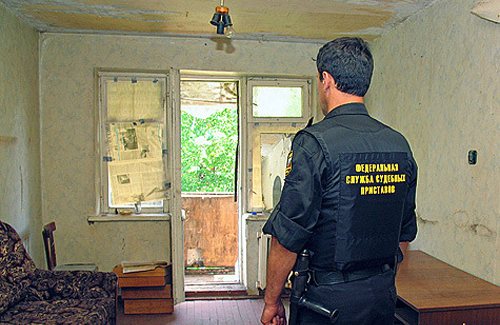
You can solve your problem much faster if you order
back call
The worst of nightmares is when, due to arrears on a credit debt, bailiffs burst into the apartment and describe all the property that the owners have, without exception. The debtor made the main mistake in this situation - he allowed the bailiffs to enter the threshold of his house. Most often, this happens due to the fear of falling under the hot hand of the local police officer. However, when making a decision in such a matter, one cannot rely on the prejudices and fear of people from the police.
Can bailiffs describe property? Do they have the right to do this?
Yes, definitely. When trying to understand how best to proceed when problems arise with bailiffs, the debtor needs to have a full understanding of what actions and events contribute to the appearance of bailiffs in your home. Firstly, there must be a delay in payments for the loan. Secondly, the bank, tired of waiting for the debtor to return the funds, files a petition with the bailiff. The bailiff's employees, in turn, review the received application and, if approved, clarify the place of residence of the loan borrower in order to visit him and describe his property. However, when inventorying property, certain conditions must be met.
The bailiff has the right to describe the debtor's property only in cases where the debtor himself, as well as the owner of the property being described, is present when writing the relevant act. In addition, there must be property that can be described. However, it is extremely rare that these three factors come together, so the bailiffs have developed a special plan of action.
Emphasizing their authority, they invade the apartment, describe the property (which can be recovered) and then transfer the rights to it to one of the residents present. And they are not at all interested in who actually has a direct connection to this or that thing. Bailiffs believe that they are doing the right thing, and if the debtor is not satisfied with their work, they suggest that he apply to the court. Ignorance of one's rights often leads the debtor to disastrous consequences.
The credit debtor must remember that if he has doubts regarding the correctness of the execution of acts of inventory of property and its arrest, then he has every right not to sign any documents that are offered to him by bailiffs. They, in turn, will break the law if they force a citizen to sign documents. It should also be taken into account that bailiffs can transfer rights to seized property directly to the borrower or his immediate relative. If one of them does not want to comply with the bailiff’s order, then the described property is received by a specialized organization. However, a third organization will be more trouble than it's worth. In this case, you will need to provide evidence that the described property is in the custody of the debtor. Such a procedure is labor-intensive and expensive, so it is not profitable for the bailiff to deal with such organizations.
Bailiffs can perform the actions described above, provided that they have described and seized property belonging directly to the debtor. However, the scope of their powers is noticeably narrowed if the loan borrower did not allow them beyond the threshold of his home. Only if the bailiff has a court decision, according to which the residents must leave the premises, can they enter the apartment. If the borrower’s debt is small, then the bailiffs will not bother again, trying to break down the doors.
In addition, the bailiff must obtain permission from a higher authority to allow him to invade someone else's apartment. And the senior bailiff, in turn, does not really like to make unnecessary problems for himself. He deals exclusively with those matters that may cause discontent in society or affect the political situation.
By creating obstacles for the bailiff on the way to your apartment, the credit debtor creates the opportunity for employees of this authority to commit a number of legal errors. This will be an excellent weapon against bailiffs during court hearings, when filing a complaint with the prosecutor's office and other governing bodies that have more rights compared to the bailiff.
It is important to understand that bailiffs do not come just like that. Most often they are sent by angry management. Also a lever for taking action is a complaint from a creditor. A wise debtor will make it clear to the bailiff that he will cause much more problems than the complaint received.
But there is no need to be afraid of the local police officer. He has much fewer rights than a bailiff. And he can break into an apartment only in three cases: the fact of committing a murder, when organizing the rescue of victims of a crime, and when hiding a fugitive from prison.
What property is seized?
What can the bailiffs describe in the apartment? This question worries many debtors. The opinion that, by a court decision, SSP employees confiscate all things is based only on ignorance of Russian laws. The Civil Code and Federal Law No. 229 indicate a list of property subject to seizure and property for which recovery cannot be carried out.

What property can be described:
- Vehicle. But if a person proves that he needs the car to carry out his professional activities, then the court can return it. The car is not subject to collection if the debtor has a disability group, and the vehicle is the only way for him to move freely.
- Real estate: apartment, cottage, house, garage. If the object is in shared ownership, then the arrest is imposed only on the share of the debtor.
- Household appliances, if they are in good working order and in good condition. The exception is technology, without which normal existence is impossible. For example, a washing machine.
- Electronics: phones, computers, laptops, etc.
- Jewelry.
- Furniture, if it is in good condition.
- Money in the amount of up to 50% of the monthly salary and other declared income. This includes benefits, all types of pensions, and vacation pay. Authorities can block all accounts of the defaulter.
The powers of bailiffs extend only to the things and money of the debtor. But what to do if you described the property of relatives who are registered in the same living space as the debtor? The bailiff, most often, does not care who owns the things. If they are located at the defaulter’s registered address, then he has the right to collect everything that is in it in accordance with the law.
It is quite difficult to prove that the seized items were purchased by a relative. This issue can only be resolved through the courts. The relative will have to write a statement to the court demanding the return of property that does not belong to the debtor. If possible, receipts and receipts should be attached to the document.
What can the bailiffs describe in the apartment?

In the course of enforcement actions to collect funds from the debtor against a debt on a consumer loan or utility bills, bailiffs can seize property. The law defines a large list of things that are not subject to arrest and seizure. A citizen cannot lose his only apartment or the things necessary for life, but he will still have to pay his debts.
What can a bailiff take for debts?
Qualified lawyers recommend using a little trick during court hearings. Immediately after the court decision on the collection of funds comes into force, you must submit to the same judge an application for a deferment or installment plan for the execution of the court decision.
A little trick: you can change the status of jointly acquired property with the help of a marriage contract, in the text of which you indicate the ownership of specific property or a general phrase that everything that will be registered in the name of the husband is his personal property and is not subject to division, and everything that is registered for the wife - similarly indivisible. Such an agreement can be drawn up at any time during the marriage, as well as before it. The document is certified by a notary.
When should you think about the fate of your property?
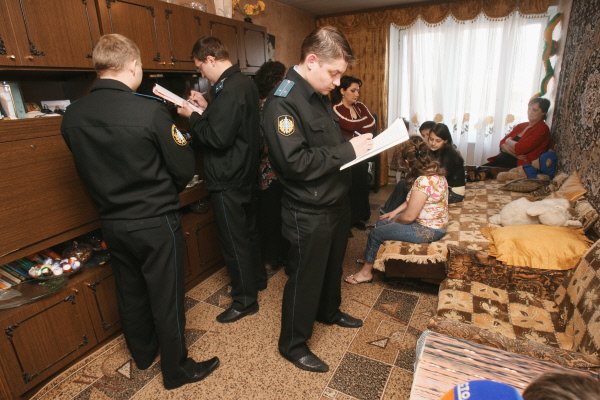
After court decisions on debt collection come into force, bailiffs receive writs of execution. Now the bailiff can begin enforcement proceedings.
He goes in search of an apartment or other place of residence of the debtor. By mail, he sends the debtor a copy of the resolution on the commencement of enforcement proceedings. From this moment on, the debtor may lose part of his property.
The debtor may be given several days to repay the debt voluntarily. If he does not take advantage of this opportunity, then in five days a resolution will be issued to describe the property in apartment . And the amount of his debt will increase by another 7 percent.
The bailiff informs the debtor about his visit in writing, by phone or via SMS. The visit time for carrying out enforcement actions is set from 6 to 22 hours on weekdays. Visiting debtors at night and on weekends is prohibited, unless this is an exceptional case when the procedure cannot be postponed.
Stages of the procedure
The inventory and seizure of property in relation to the debtor is carried out by the Federal Bailiff Service on the basis of a court order. How does this procedure happen?
- The court issues an order of arrest and issues a writ of execution to the plaintiff. The document is sent to the FSSP at the place of registration of the defendant.
- The defaulter is notified of the commencement of proceedings against him by registered mail. He is given 5 days to repay the debt. If the entire amount is paid, the proceedings are closed.
- If a person does not pay the plaintiff within 5 days, a written notice about the visit of the bailiffs is sent to his address.
How the property is described:
The process of compiling an inventory is regulated by the official standards of bailiffs and the law “On Enforcement Proceedings”. Bailiffs describe the property in the presence of witnesses. If they are not there, the citizen has the right to file a complaint with the head of the local SSP for violation of official duties of employees.
- The bailiff must draw up an act, which must indicate the details of witnesses, the debtor, a list of property, its characteristics, condition and valuation.
- The first thing that is seized is the card and bank accounts. To do this, service employees do not have to visit the defendant’s apartment - the issue is resolved through the bank.
- If, after listing the accounts, the amount of debt is not repaid, then foreclosure on other types of property is carried out against the debtors.
How does debt repayment work according to law?
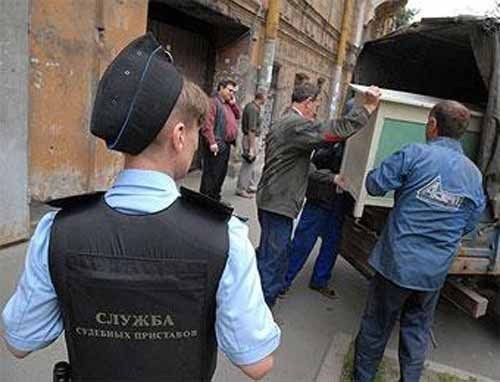
- — Bailiffs send requests to various structures to find out whether the debtor has vehicles or real estate.
- — If the debt exceeds 10 thousand rubles. the debtor is prohibited from leaving the country; this restriction can be applied several times.
- Bailiffs real estate and impose a ban on re-registration of the car, that is, the debtor can give it or sell it to anyone.
- — If bank deposits and plastic cards issued in the name of the debtor are discovered, all accounts on them are also frozen. All available funds are written off against debt.
If no money is found in the accounts, or the collected amount cannot cover the apartment is seized . It is first described . then they are seized, assessed and sent to auction, which is held by special organizations. Of course, everything is sold at a low price. The proceeds will be sent to creditors or utility companies.
If in this case the funds are not enough to pay the debt in full, then 50% of all earnings, pensions and other income are confiscated from the debtor.
Powers of bailiffs under the law
It is important to understand what bailiffs have the right to and not to interfere with them in the performance of their official duties. If you can convince the FSSP representative of your readiness to assist, then you can voluntarily repay the debt with payments that are feasible for you.
- The first thing that enforcement proceedings begin with is the search for a citizen’s accounts in Russian banks. Financial institutions are required to provide such information upon request of the FSSP. Found accounts will be frozen, and funds and proceeds will be used to pay off the debt. An indication of this is contained in Article 70 of the Federal Law “On Enforcement Proceedings”.
- After the verification of ruble accounts is completed, the bailiff will look for foreign currency accounts, securities, shares and other financial assets. Only after this the recovery passes to the debtor’s property. While the process is ongoing, you can voluntarily pay off the debt.
Useful articles
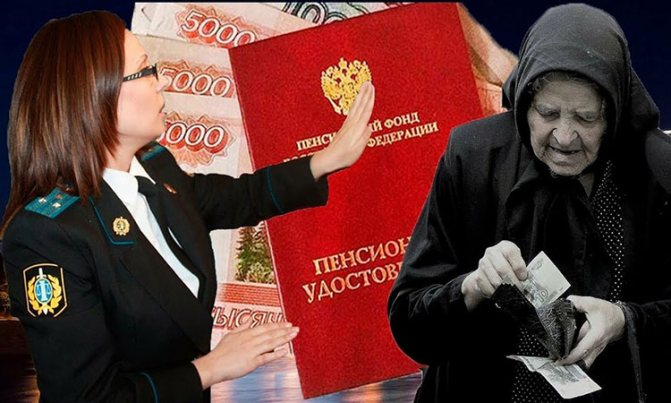
Can bailiffs seize a pension?
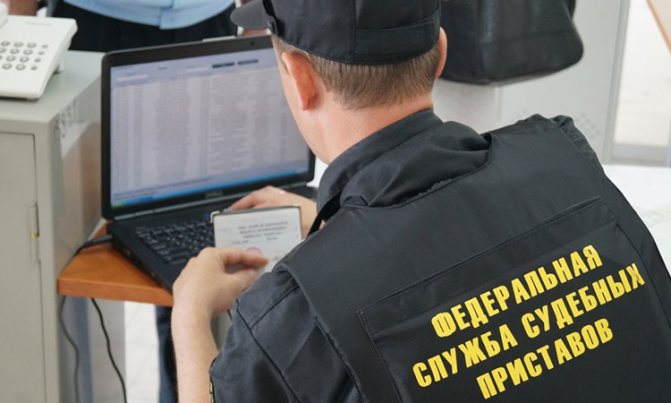
What to do if bailiffs have withdrawn money from your card

How do bailiffs work?
- Article 69 gives the FSSP the right to impose a penalty on the defendant’s wages. To do this, an official request is drawn up and sent to your place of official employment. In this case, your company’s accountant will transfer 50% of earnings to the bailiff. When collecting child support, compensation for damage to health, and in some other situations, 70% of income may be transferred.
- If sources of income are not found, the bailiff looks for movable and immovable property. Things are described, the apartment is seized and sold at auction. The proceeds are used to pay off the debt and collect the bailiff's wages. Articles No. 99, 33 are devoted to this.
- Sometimes people who received a summer cottage plot during the USSR are in no hurry to register it as their property and use the right of perpetual ownership. The bailiff can independently order cadastral work, register your land ownership, and then seize it and sell it. You will have to not only pay off the existing debt, but also pay for these works. Articles of the law No. 64, 66.
One of the extreme measures is a ban on leaving the country or driving a car. However, if the debtor has neither a license nor a foreign passport, they are ineffective.
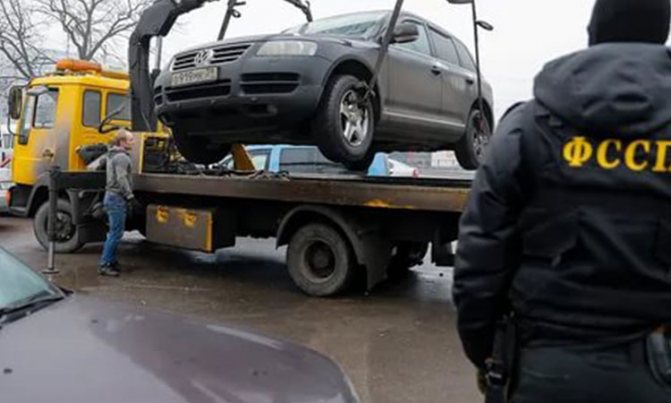
What property in the apartment can be seized in the apartment?

The bailiffs believe that all the things in the apartment . where the debtor lives belongs to him. Therefore, they describe all the things that are allowed to be levied.
The refrigerator and stove in the apartment cannot be described . since they are necessary for daily life. A washing machine can be vital if there are small children or disabled people in the family. A TV or stereo system will most likely be described. can also be seized if it is not a tool of labor and if its owner does not engage in freelancing, that is, remote work on the Internet. Jewels, decorations and other luxury items in the apartment the bailiffs describe them .
According to the rules, the only housing cannot be seized. But may be imposed on him in the form of arrest, which will be recorded in Rosreestr.
If the apartment was purchased with a mortgage, it may be seized and put up for sale.
What property in the apartment is prohibited from being described?
Article 446 of the Code of Civil Procedure of the Russian Federation defines a list of property owned by the debtor, which bailiffs cannot and seize . The prohibited list includes:
- - residential premises or part thereof, the only one suitable for habitation,
- - land plot under the house,
- - interior items, everyday items,
- - equipment necessary for professional activities, if it costs no more than 100 minimum wages,
- - personal belongings, clothing, shoes located,
- - products,
- - souvenirs and awards.
- — money, no more than 5 thousand rubles.
- - livestock, animals, birds, bees, outbuildings where livestock are kept,
- - seeds of vegetable and garden plants,
- — heating means, transport (for disabled people),
What can't they take away from the debtor?
During the confiscation process, bailiffs are guided by the writ of execution. This document is compiled based on a number of limitations. For loan debts, the borrower will keep the following items with him:
- Personal belongings of the debtor and immediate relatives. Such things include clothing, shoes, food, toys, etc. All these objects are united by one property - they are in constant use.
- Property that is owned by the borrower for temporary use. According to the law, its owner is another citizen to whom the credit debts have no relation.
- Essential items - this category includes furniture, heaters, kettles, stoves, hobs.
- Objects that are a means of earning money for the debtor or his immediate family (professional equipment, musical instruments, creative tools, etc.).
- The property in which the debtor and his relatives live. This section also includes the land plot on which the housing is located (if it means a private house).
- Prizes and awards.
- Money and material assets that were earned by the perpetrator as a result of legitimate work activities.
- Money in the amount of the subsistence level, which is established by law for a specific region.
- Financial resources that the borrower received as a result of cashing out a maternity capital certificate.

How to behave with bailiffs?
When there is a knock on the door in the apartment , open it immediately. It is better to cooperate with them than to enter into conflicts. There is no point in hiding from them, because according to the law they are given the right to enter the house and conduct an inspection without the permission of the debtor, and even in his absence.
If necessary, bailiffs can break down the front door of an apartment , enter and describe the property without the presence of the debtor. Written permission to perform such actions can be issued by a senior bailiff. When seizing property to be confiscated, witnesses are invited and must sign the seizure document.
Seizure of property: what bailiffs can and cannot seize
- luxury items, if their real value is close to the amount of the resulting debt (antiques, original paintings by famous artists, expensive antique vases and other similar things can always be taken by state bailiffs);
- jewelry and jewelry (their price should also be comparable to the amount of debt);
- household appliances that a person can theoretically do without (microwave oven, multi-cooker, juicer, washing machine, etc.), while such a decision of the bailiffs can always be challenged in court, for this the debtor must prove that normal existence is impossible without the seized items and living in an apartment;
- items of household appliances that the debtor has in double or triple quantities (if there are two refrigerators or TVs in the apartment, the bailiffs have the right to take away one of them, and most likely they will choose a more expensive option rather than an old or broken item of household appliances) ;
- purebred pets (dogs, cats, etc.) that have a high value (seizure of such live property by bailiffs is possible only if there are conditions for keeping domestic animals).
We recommend reading: Noise Works in Moscow on Saturday
How should a bailiff act according to the law?

When meeting with the debtor, he is obliged to present his identification and resolution, and carry out enforcement actions within the framework of the law. Even if he is forced, he cannot raise his tone, threaten, or behave incompetently. After all, the debtor, for his part, can write a complaint against him or file a lawsuit in order to protect his honor and dignity. Such cases in court, as practice shows, are often resolved in favor of the debtor.

